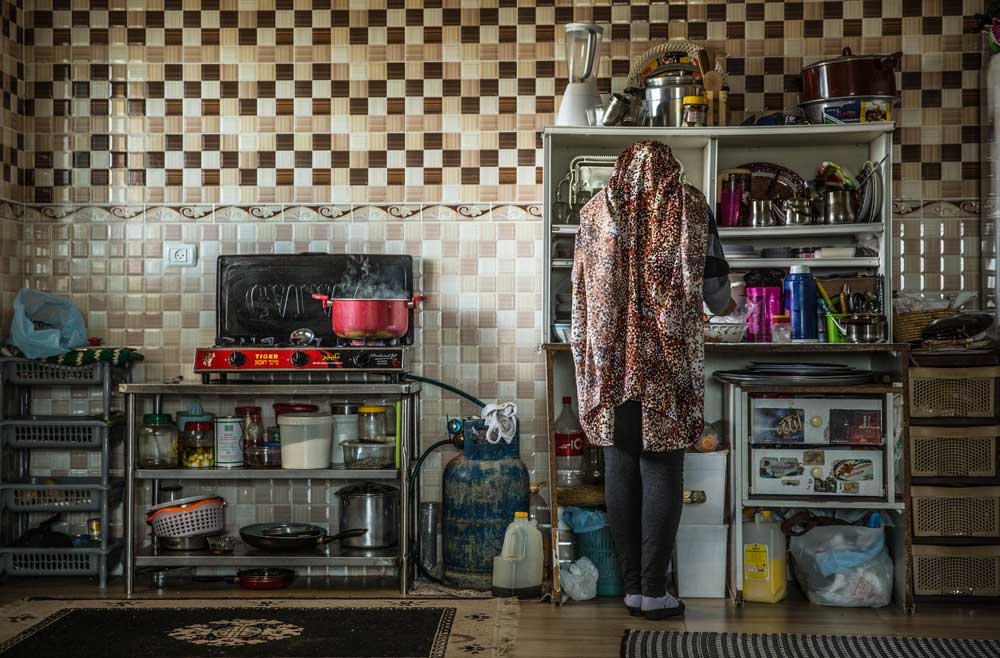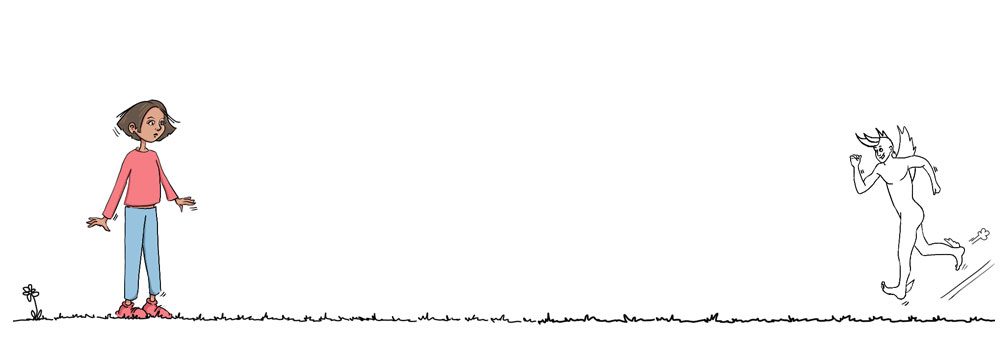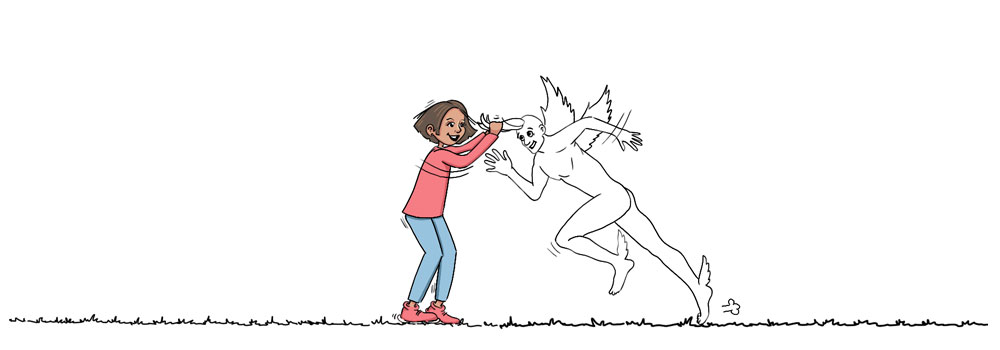Task 12 – Grab a hold of the moment
Task 12
Seize the moment

“The situation was so good that I had to grab my bag and get the camera.” As photographers, we not only have to perceive the moments, we also have to seize them. Here, the precisely placed kitchenware triggered May Britt visually. May Britt’s strength as a photographer is identifying repetitious, complex color patterns. Study how the colors blue, yellow and red move in this picture. We only perceive the rhythm of the color when we look for it. It works repetitively, like drums and bass in music. The photo offers us insight into an unfamiliar kitchen. The camera gives us the excuse for visiting otherwise closed spaces. The mystery involved in the woman being turned away from us makes it possible for us to use our imagination. We can also study the room more freely since our eyes are not being drawn to her face. How would this picture have turned out if instead she was facing us? Feel free to try both approaches because we don’t know in advance what is going to work best.
Palestine, 2015. Photo: May Britt Madland
Problem
Indecisiveness
I have never had a permanent job due to me wanting to be able to choose how I spend my hours, days and weeks. I love to plan my projects, journeys and adventures and compose my own agenda. The exception to this was the year I worked at the Center for Child and Ado- lescent Psychiatry. Then, many of the choices connected to how I spent my time fell by the wayside. My life revolved around getting up, taking the metro to work and then returning home and eating dinner. I had a minimum amount of influence over how I used my time during the day. I went from meeting to meeting in which other people set the agenda. The lack of choices made me worse at making decisions. I became lethargic, like a caged animal. That was the longest year of my life.
If we are not regularly exposed to having choices before us, the ability to make them disappears. Avoiding making a decision is also a decision. Then we are leaving the choice to others who have a greater willpower in regard to making decisions. We are then sitting there in the passenger seat while others have their hands on the steering wheel.
At my doctor’s office, I meet many people who lack the motivation, willpower or energy for action. They continue to be stuck in the same untenable situation over a long period of time even when it is obvious to both them and myself that they have to take action. It has become a habit for them to let the moments and opportunities pass by. And, as a rule, they are in fact aware of what they should do. It is better to make a wrong decision than to not make one at all. So, get started and make adjustments later on!
Do you know someone who is paralyzed when it comes to acting – or, conversely, really good at making decisions? How do these characteristics affect their lives?
On a scale of 1 to 6, how relevant is this issue for you?:

Solution
Grab opportunities
At photography workshops I meet people who have a strong capacity for action. Making a number of choices is required for getting out and taking photos, such as when you should go, where you are going to go, what you are going to photograph, how you will compose the picture, when to move on. Photography is decision-making.
The choices keeps coming; should you move to the left or to the right, should you go towards the sea, should you venture over to the lady who is raking leaves in the garden, should you have the sun coming in from behind or from the side or should you wait until a cloud comes.
The camera forces us to make decisions. There is an art in pressing the shutter button at the right moment. But most often we miss this moment and most of our pictures turn out mediocre at best. But who has the greatest chance of succeeding – the person who tries and tries again or the one who doesn’t press the shutter button at all?
In order to be in control of our lives, we have to choose. And through taking photographs, we get used to choosing some things – and to eliminating other ones. We manage to capture crucial moments with our brains and hands. We make choices that rub off on our personali- ties. We improve our ability to grab the opportunities that appear, also without the camera.
Photo assignment:
Go on a hunt for photos that are snapshots of moments – of people in a street scene or objects in motion. For each picture that you take, your ability to make decisions will sneak in and be a part of it.
How useful was this task for you on a scale of 1 to 6?
BOOK SUGGESTION: The Art of Takin Action by Gregg Krech

❞ There are two days in the year that we can not do anything, yesterday and tomorrow.
Gandhi
❞Knowing is not enough; we must apply. Being willing is not enough;
we must do.
Leonardo da Vinci
❞If you wait until the wind and the weather are just right, you will never plant anything and never harvest anything.
Ecclesiastes 11:4
[note_editor]

